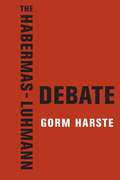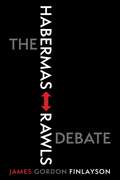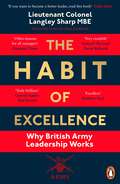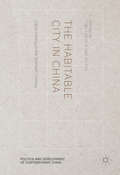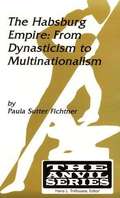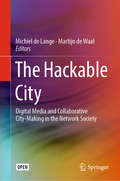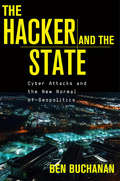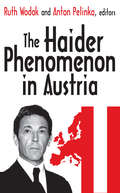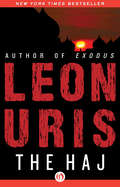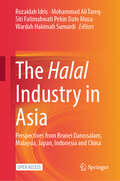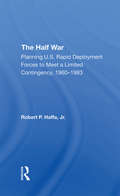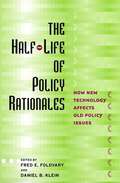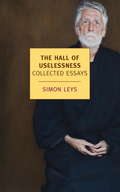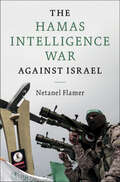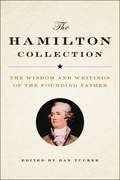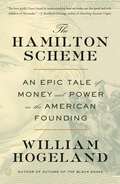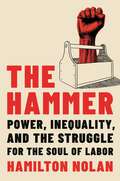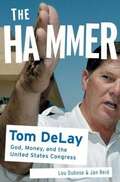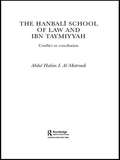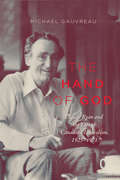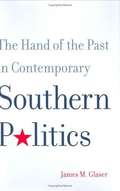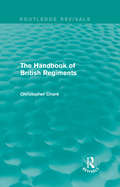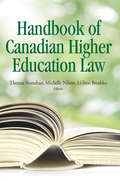- Table View
- List View
The Habermas-Luhmann Debate
by Gorm HarsteFifty years ago, the two leading German philosophers and sociologists since the Second World War, Jürgen Habermas and Niklas Luhmann, embarked on a sweeping and contentious debate that would continue for decades. Their coauthored 1971 book Theory of Society or Social Technology laid out their opposing positions on meaning, communication, consensus, and dissent—and ultimately the foundations of modern social thought. Habermas and Luhmann would elaborate their disagreement in the years to come in a controversy whose aftershocks divided social theorists by presenting what appeared to be two fundamentally divergent views of the nature of society and what systems theory was capable of explaining.This is the first book in English about one of the most important conflicts in social theory today. Gorm Harste analyzes the Habermas-Luhmann debate from its inception through Habermas’s most recent works, exploring issues such as methodology, ideology, truth, history, and politics. He contextualizes their positions in terms of how each grappled with the legacy of Nazism and sought to provide grounding for an antitotalitarian politics. Harste follows the evolution of the debate, as the fundamental dispute over the normative and practical desirability of agreement and disagreement came to touch upon political questions including the rule of law, the separation of powers, human rights, individualization, and secularization. Ultimately, Harste emphasizes the convergence between Habermas and Luhmann—and the pressing need for social theorists to further unite these two formative accounts of contemporary society.
The Habermas-Rawls Debate
by James Gordon FinlaysonJürgen Habermas and John Rawls are perhaps the two most renowned and influential figures in social and political philosophy of the second half of the twentieth century. In the 1990s, they had a famous exchange in the Journal of Philosophy. Quarreling over the merits of each other’s accounts of the shape and meaning of democracy and legitimacy in a contemporary society, they also revealed how great thinkers working in different traditions read—and misread—one another’s work.In this book, James Gordon Finlayson examines the Habermas-Rawls debate in context and considers its wider implications. He traces their dispute from its inception in their earliest works to the 1995 exchange and its aftermath, as well as its legacy in contemporary debates. Finlayson discusses Rawls’s Political Liberalism and Habermas’s Between Facts and Norms, considering them as the essential background to the dispute and using them to lay out their different conceptions of justice, politics, democratic legitimacy, individual rights, and the normative authority of law. He gives a detailed analysis and assessment of their contributions, assessing the strengths and weaknesses of their different approaches to political theory, conceptions of democracy, and accounts of religion and public reason, and he reflects on the ongoing significance of the debate. The Habermas-Rawls Debate is an authoritative account of the crucial intersection of two major political theorists and an explication of why their dispute continues to matter.
The Habit of Excellence: Why British Army Leadership Works
by Lt Col Langley SharpThe official British Army book on what makes its leadership so successful, and how to become a better leader yourself - whatever your field. ___________________'If you want to become a better leader, read this book' Eddie Jones'An extraordinary read for any leader. Truly brilliant' General Stanley McChrystal, author of Team of Teams'Excellent. Offers proven tools and strategies' Matthew Syed___________________ The Habit of Excellence is a unique insight into British Army leadership, explaining what makes it unique, what makes it so effective and what civilians can take from it to become better leaders themselves. Drawing on the latest research in military history, business, sociology, psychology and behavioural science, and with compelling illustration from British Army operations across the centuries, Lt Col Langley Sharp MBE goes beyond the latest leadership fads to distil into one peerlessly authoritative work the essence of leading and leadership from one of the world's most revered institutions.___________________'Excellent. It's hard to see how any leader, whatever their field, wouldn't benefit from reading and rereading it' New Statesman 'Offers lessons for all managers' Financial Times 'Valuable in any walk of life' General Sir Mike Jackson, former Chief of the General Staff 'Very readable. I could not recommend this exceptional book more' General The Lord David Richards, former Chief of the Defence Staff 'Comprehensive and clearly written' Karin von Hippel, Director-General of RUSI 'Terrific. Full of insights and lessons' General David Petraeus, former Director of the CIA
The Habitable City in China
by Toby Lincoln Xu TaoThis book offers a new perspective on Chinese urban history by exploring cities as habitable spaces. China, the world's most populous nation, is now its newest urban society, and the pace of this unprecedented historical transformation has increased in recent decades. The contributors to this book conceptualise cities as first providing the necessities of life, and then becoming places in which the quality of life can be improved. They focus on how cities have been made secure during times of instability, how their inhabitants have consumed everything from the simplest of foods to the most expensive luxuries, and how they have been planned as ideal spaces. Drawing examples from across the country, this book offers comparisons between different cities, highlights continuities across time and space--and in doing so may provide solutions to some of the problems that continue to affect Chinese cities today.
The Habsburg Empire: From Dynasticism to Multinationalism
by Paula S. FichtnerDr. Fichtner presents a concise summary of the development and problems of the Habsburg Empire as a multi-ethnic state from the sixteenth century to the end of World War I. Twenty-six documents, some from local journals and periodicals of the era, illustrate the political, cultural, and economic relations of the Habsburg peoples, both with their rulers and with one another.
The Habsburg Monarchy 1618-1815
by Charles W. IngraoThis is a revised and updated edition of a highly acclaimed history of the early modern Habsburg monarchy. Charles W. Ingrao challenges the conventional notion of Habsburg state and society as peculiarly backward by tracing its emergence as a military and cultural power of enormous influence. The Habsburg monarchy was undeniably different from other European polities: geography and linguistic diversity made this inevitable, but by 1789 it had laid the groundwork for a single polity capable of transcending its uniquely diverse cultural and historic heritage. Charles W. Ingrao unravels the web of social, political, economic and cultural factors that shaped the Habsburg monarchy during the period, and presents this complex story in a manner that is both authoritative and accessible to non-specialists. This new edition includes a revised text and bibliographies, new genealogical tables, and an epilogue which looks forward to the impact of the Habsburg monarchy on twentieth-century events.
The Hackable City: Digital Media and Collaborative City-Making in the Network Society
by Michiel De Lange Martijn De WaalThis open access book presents a selection of the best contributions to the Digital Cities 9 Workshop held in Limerick in 2015, combining a number of the latest academic insights into new collaborative modes of city making that are firmly rooted in empirical findings about the actual practices of citizens, designers and policy makers. It explores the affordances of new media technologies for empowering citizens in the process of city making, relating examples of bottom-up or participatory practices to reflections about the changing roles of professional practitioners in the processes, as well as issues of governance and institutional policymaking.
The Hacker and the State: Cyber Attacks and the New Normal of Geopolitics
by Ben BuchananThe threat of cyberwar can feel very Hollywood: nuclear codes hacked, power plants melting down, cities burning. In reality, state-sponsored hacking is covert, insidious, and constant. It is also much harder to prevent. Ben Buchanan reveals the cyberwar that’s already here, reshaping the global contest for geopolitical advantage.
The Haider Phenomenon
by Anton PelinkaAustria does not often make political headlines. It has at least twice in recent years: in 1986, when the ""Waldheim Affair"" was debated worldwide, and in 1999, when the Austrian Freedom Party (FPOe) under Joerg Haider received 27 percent of the vote in national elections. Established by former Nazis for former Nazis, the FPOe entered the mainstream of Austrian politics when it became part of a coalition government. This volume explores whether its rise is a uniquely Austrian phenomenon or corresponds to broader social and political changes in Europe.Parallels to Haider's party can be found in other European countries. Its anti-immigration agenda and rhetoric are similar to those of the French FN, the Belgian Vlaams Bloc, and the Italian Lega Nord. And its anti-European Union posture is similar to the sentiments of the ""anti-Maastrich"" wing of the British conservative party. However, European reaction to the FPOe's rise derives not only from its policies, but its linkage to past suspicions that the Austrians have not learned the lessons of history as had the Germans. The FPOe's success strengthened that impression. In response, 14 European Union governments downgraded their bilateral relations with the Austrian government to a purely technical level. Although the sanctions were lifted in September 2000, the spotlight is still very much on Austria, and concern about the FPOe remains high.This important volume contains eleven chapters by internationally prominent scholars from a broad spectrum of the social sciences. Its cross-disciplinary approach provides perspective on the Haider phenomenon, its rhetoric, and its impact on daily life in Austria. It also analyzes the influence of right-wing populism on politics, culture, and society, and its implications in Austria as well as elsewhere in Europe. The Haider Phenomenon will be of interest to historians, political scientists, those in European studies, and scholars in contemporary political extremism.
The Haj
by Leon UrisA proud Arab family in Palestine struggles to hold on to its identity during the birth of the State of Israel In the early 1920s, young Ibrahim al Soukori has achieved his dreams of heading his small Palestinian town, becoming a proud father, and making the pilgrimage to Mecca. But his family's journey has just begun, and soon global war and Israel's formation force them on a path to possible dissolution. Ibrahim's sons and daughters squabble and find peace with the nearby kibbutz, suffer betrayals, and hold together even when displaced to distant refugee camps. Written by an author best known for his sympathetic portrayal of Israel's difficult birth, The Haj speaks to the history of a troubled region from the perspective of a remarkable Arab dynasty. This ebook features an illustrated biography of Leon Uris including rare photos from the author's estate.
The Halal Industry in Asia: Perspectives from Brunei Darussalam, Malaysia, Japan, Indonesia and China
by Rozaidah Idris Mohammad Ali Tareq Siti Fatimahwati Pehin Dato Musa Wardah Hakimah SumardiThis innovative, open access volume explores the core characteristics of the halal industry through case studies of five East and Southeast Asian countries—Brunei Darussalam, Malaysia, Japan, Indonesia and China—representing both Muslim-majority and Muslim-minority societies. The contributors focus on some of the leading sectors of the Islamic economy, comprising food, finance, pharmaceuticals, and travel and tourism, in order to diagnose the challenges they face and the opportunities that present themselves. Particular attention is given to issues of certification and compliance, quality assurance, human resource development, education, legal frameworks, logistics and supply chains, innovation, sustainability, and growth potential beyond the core Muslim consumers in order to offer a critical assessment of the state of the halal industry in comparative perspective. The book shows that one of the most remarkable features of the world economy over the last two decades has been the emergence and sustained growth of the global halal industry. This has been underpinned by several key factors, including a young and expanding Muslim population, Islamic faith-inspired consumption, and a number of public and private strategies dedicated to halal product and service development. This is a significant achievement, especially given major disruptions and risks such as geopolitical instability, the worsening climate crisis, the impact of the Covid-19 pandemic and the uncertainties associated with AI and automation. Academic scholars, university students and others interested in the study of the current state of the halal industry in Asia and broader questions of the global Islamic economy will find this volume an invaluable resource to enable them to understand these pressing challenges and navigate this opportunity landscape.
The Half War: Planning U.s. Rapid Deployment Forces To Meet A Limited Contingency 1960-1983
by Robert P Haffa JrThis book offers a strategic, organizational, and logistical analysis in a historical context of the planning of conventional forces to meet a limited contingency. The central question is: Why, from 1960 to 1982, did the U.S. fail to construct a coherent limited contingency force? Analysis of a series of comparative case studies reveals that the strategic concept to the "half war," or limited contingency, was never articulated adequately enough to support specific force planning. Organizations designed to oversee and command limited contingency forces, fragmented by interservice rivalries and the absence of joint doctrine, lacked multiservice composition and a unified command structure. A search for economy in limited contingency forces seemed justified by illusions about their capabilities. Low budgetary priority and Congressional perceptions that enhanced U.S. rapid deployment capabilities would encourage U.S. global intervention contributed to the lack of logistical and mobility systems dedicated to them. The wider intent of this study is to shed light on the general purpose force planning process and to suggest policy guidance as the United States once again embarks on a major conventional force planning initiative. Rather than being trapped by the past, new efforts to meet vital U.S. military interests below the nuclear threshold must identify "half war" planning contingencies, structure unified commands capable of directing tailored conventional forces in specific theaters, and provide adequate strategic mobility systems.
The Half-Life of Policy Rationales: How New Technology Affects Old Policy Issues
by Daniel B. Klein Fred E. FoldvaryThe Half-Life of Policy Rationales argues that the appropriateness of policy depends on the state of technology, and that the justifications for many public policies are dissolving as technology advances. As new detection and metering technologies are being developed for highways, parking, and auto emissions, and information becomes more accessible and user-friendly, this volume argues that quality and safety are better handled by the private sector. As for public utilities, new means of producing and delivering electricity, water, postal, and telephone services dissolve the old natural-monopolies rationales of the government.This volume includes essays on marine resources, lighthouses, highways, parking, auto emissions, consumer product safety, money and banking, medical licensing, electricity, water delivery, postal service, community governance, and endangered species. The editors have mobilized the hands-on knowledge of field experts to develop theories about technology and public policy. The Half-Life of Policy Rationales will be of interest to readers in public policy, technology, property rights, and economics.
The Hall of Uselessness
by Simon LeysAn NYRB Classics OriginalSimon Leys is a Renaissance man for the era of globalization. A distinguished scholar of classical Chinese art and literature and one of the first Westerners to recognize the appalling toll of Mao's Cultural Revolution, Leys also writes with unfailing intelligence, seriousness, and bite about European art, literature, history, and politics and is an unflinching observer of the way we live now.The Hall of Uselessness is the most extensive collection of Leys's essays to be published to date. In it, he addresses subjects ranging from the Chinese attitude to the past to the mysteries of Belgium and Belgitude; offers portraits of André Gide and Zhou Enlai; takes on Roland Barthes and Christopher Hitchens; broods on the Cambodian genocide; reflects on the spell of the sea; and writes with keen appreciation about writers as different as Victor Hugo, Evelyn Waugh, and Georges Simenon. Throughout, The Hall of Uselessness is marked with the deep knowledge, skeptical intelligence, and passionate conviction that have made Simon Leys one of the most powerful essayists of our time.
The Hamas Intelligence War against Israel (Intelligence and National Security in Africa and the Middle East)
by Netanel FlamerSince its founding in 1987, the political and ideological dimensions of the terror organisation Hamas have been well discussed by scholars. In contrast, this innovative study takes a new approach by exploring the entire scope of Hamas's intelligence activity against its state adversary, Israel. Using primary sources in Arabic, Hebrew and English, Netanel Flamer analyzes the development of Hamas's various methods for gathering information, its use of this information for operational needs and strategic analysis, and its counterintelligence activity against the Israeli intelligence apparatus. The Hamas Intelligence War against Israel explores how Hamas's activity has gradually become more sophisticated as its institutions have become more established and the nature of the conflict has changed. As the first full-length study to analyze the intelligence efforts of a violent non-state actor, this book sheds new light on the activities and operations of Hamas, and opens new avenues for intelligence research in the wider field.
The Hamilton Affair: A Novel
by Elizabeth CobbsA New York Times Bestseller and one of the best historical fiction books of 2016 and 2017!“A juicy answer to Ron Chernow's Alexander Hamilton…” --CosmopolitanSet against the dramatic backdrop of the American Revolution, and featuring a cast of legendary characters, The Hamilton Affair tells the sweeping, tumultuous, true story of Alexander Hamilton and Elizabeth Schuyler, from passionate and tender beginnings of their romance to his fateful duel on the banks of the Hudson River.Hamilton was a bastard and orphan, raised in the Caribbean and desperate for legitimacy, who became one of the American Revolution's most dashing--and improbable--heroes. Admired by George Washington, scorned by Thomas Jefferson, Hamilton was a lightning rod: the most controversial leader of the new nation. Elizabeth was the wealthy, beautiful, adventurous daughter of the respectable Schuyler clan--and a pioneering advocate for women. Together, the unlikely couple braved the dangers of war, the perils of seduction, the anguish of infidelity, and the scourge of partisanship that menaced their family and the country itself.With flawless writing, brilliantly drawn characters, and epic scope, The Hamilton Affair tells a story of love forged in revolution and tested by the bitter strife of young America, and will take its place among the greatest novels of American history ever written.
The Hamilton Collection: The Wisdom and Writings of the Founding Father
by Dan TuckerThe subject of a New York Times best-selling biography and a Pulitzer-Prize winning musical, interest in Alexander Hamilton is at an all-time high. This carefully curated collection of Hamilton's writings gives the reader an intimate glimpse into the mind of our most misunderstood founding father.The smash-hit musical Hamilton presents its central character as a truth-telling immigrant boot-strapper who used his extraordinary intelligence to make good--but what was he really like? Let the man himself, a prolific and extremely effective writer, tell his story in his own words. Organized chronologically, this collection of Alexander Hamilton's personal letters, business and governmental correspondence, and excerpts from his most important published writings (including the Federalist Papers) gives readers first-hand insight into this highly influential founding father who engineered the ratification of the US Constitution, created the UnitedStates' financial system, and established friendly trade relations with Britain. The book includes love letters to Elizabeth Schuyler, who became his wife, and correspondence with his friend-turned-nemesis, Aaron Burr, which led to the duel in Weehawken that ended Hamilton's life at the age of 47. Also included are responses from some of his correspondents that give a 360-degree view of the man so esteemed by his protector and friend, George Washington, but reviled by others, including Washington's successor as president, John Adams.Illustrated with 50 illustrations, drawings, document facsimiles and more, the text is accompanied throughout by explanatory annotations from editor Dan Tucker who also provides introductions to each chapter and a preface.Dan Tucker is a writer and editor living in Brooklyn. He is the founder of Sideshow Media, a New York-based independent producer of books and digital content focused on history,the arts, pop culture, and travel.
The Hamilton Scheme: An Epic Tale of Money and Power in the American Founding
by William Hogeland"William Hogeland is the best guide I have found to understanding how we today are, for good and evil, children of Alexander.” —J. Bradford DeLong, professor of economics at the University of California, Berkeley, and author of Slouching Towards UtopiaHow Alexander Hamilton embraced American oligarchy to jumpstart American prosperity. “Forgotten founder” no more, Alexander Hamilton has become a global celebrity. Millions know his name. Millions imagine knowing the man. But what did he really want for the country? What risks did he run in pursuing those vaulting ambitions? Who tried to stop him? How did they fight? It’s ironic that the Hamilton revival has obscured the man’s most dramatic battles and hardest-won achievements—as well as downplaying unsettling aspects of his legacy. Thrilling to the romance of becoming the one-man inventor of a modern nation, our first Treasury secretary fostered growth by engineering an ingenious dynamo—banking, public debt, manufacturing—for concentrating national wealth in the hands of a government-connected elite. Seeking American prosperity, he built American oligarchy. Hence his animus and mutual sense of betrayal with Jefferson and Madison—and his career-long fight to suppress a rowdy egalitarian movement little remembered today: the eighteenth-century white working class. Marshaling an idiosyncratic cast of insiders and outsiders, vividly dramatizing backroom intrigues and literal street fights—and sharply dissenting from recent biographies—William Hogeland’s The Hamilton Scheme brings to life Hamilton’s vision and the hard-knock struggles over democracy, wealth, and the meaning of America that drove the nation’s creation and hold enduring significance today.
The Hammer: Power, Inequality, and the Struggle for the Soul of Labor
by Hamilton NolanA timely, in-depth, and vital exploration of the American labor movement and its critical place in our society and politics today, from acclaimed labor reporter Hamilton Nolan. Inequality is America&’s biggest problem. Unions are the single strongest tool that working people have to fix it. Organized labor has been in decline for decades. Yet it sits today at a moment of enormous opportunity. In the wake of the pandemic, a highly visible wave of strikes and new organizing campaigns have driven the popularity of unions to historic highs. The simmering battle inside of the labor movement over how to tap into its revolutionary potential—or allow it to be squandered—will determine the economic and social course of American life for years to come. In chapters that span the country, Nolan shows readers the actual places where labor and politics meld. He highlights how organized labor can and does wield power effectively: a union that dominates Las Vegas and is trying to scale nationally; a successful decades-long campaign to organize California's child care workers; the human face of a surprising strike of factory workers trying to preserve their pathway to the middle class. Throughout, Nolan follows Sara Nelson, the fiery and charismatic head of the flight attendants&’ union, as she struggles with how (and whether) to assert herself as a national leader, to try to fix what is broken. The Hammer draws the line from forgotten workplaces in rural West Virginia to Washington&’s halls of power, and shows how labor solidarity can utterly transform American politics—if it can first transform itself. A labor journalist for more than a decade, Nolan helped unionize his own industry. The Hammer is a urgent on-the-ground excavation of the past, present, and future of the American labor movement.
The Hammer: Tom DeLay, God, money, and the rise of the Republican Congress
by Lou Dubose Jan ReidA lively, hard-hitting biography of the pro-business, pro-Jesus, anti-government, anti-environment House majority leader who is driving today's Congressional agenda. Tom DeLay didn't look like he was going to amount to much. He started his professional career as owner of a pest control business. His colleagues in the Texas Legislature thought him unremarkable, if good fun at a party; they called him "Hot Tub Tom." Today, Tom DeLay is arguably the most powerful man in Congress; one who has helped to undermine age-old procedural traditions and to turn the House into a single-party operation-all without the backing of Karl Rove or George W. Bush. How did he get from there to here? In The Hammer Lou Dubose and Jan Reid track DeLay's rise to the pinnacle of power, illuminating not only his personality and policies but the forces in American politics which have made him a player. Long know n for his inflammatory oratory-he dubbed the Environmental Protection Agency 'the Gestapo of Government,' and said he hadn't served in Vietnam because too many minorities had signed up leaving no room for people like him-DeLay's real power resides in his mastery of the loopholes and evasions of campaign finance law and of Byzantine congressional procedure, as well as his deep ties to the evangelical Christian right. This first book-length examination of DeLay, based on the authors' long-term acquaintance with him from his early days in the Texas Legislature and recent original reporting, illuminates not only who DeLay is and what he wants, but why Americans should be plenty concerned about it.
The Hanbali School of Law and Ibn Taymiyyah: Conflict or Conciliation (Culture and Civilization in the Middle East)
by Abdul Hakim Al-MatroudiThe Hanbali School of Law and Ibn Taymiyyah provides a valuable account of the development of Hanbalite jurisprudence, placing the theoretical and conceptual parameters of this tradition within the grasp of the interested reader. Studying the vibrant yet controversial interaction between Ibn Taymiyyah and the Hanbali School of law, this book assesses to what extent this relationship was a conflict or reconciliation. The author takes a detailed exploration of the following issues: the strength of contributions made to this School by earlier paragons associated with Ahmad Ibn Hanbal the contextual constructs which shaped the tradition’s development the methodology and literature synonyms within the classical School the manner by which Ibn Taymiyyah engaged with the Hanbali tradition the impact of his thought upon the later expression of the School’s legal doctrines and its theoretical principles the contribution made by this School in general to the synthesis of Islamic law. Giving background material to the Hanbali School of law, this book is a vital reference work for those with interests in Islamic law, the history of the Hanbalite tradition and its principle luminaries.
The Hand of God: Claude Ryan and the Fate of Canadian Liberalism, 1925-1971 (Carleton Library Series #243)
by Michael GauvreauSet against a background of intense religious and cultural change and tensions over the meanings of nationalism and federalism in both Quebec and Canada, Michael Gauvreau's The Hand of God traces the emergence of Claude Ryan as a public intellectual. This is the first comprehensive biography of Ryan based on his personal papers and extensive writings as a social commentator, editorialist, and director of the newspaper Le Devoir. At a time of Catholic religious fervour and new currents of social analysis, Ryan spoke for a postwar generation of young Quebecers, assuring his surprising ascension as one of the most influential voices in Canadian liberalism and federalism in the 1960s. In rich detail, Gauvreau describes Ryan’s ideas on religion, politics, and society, which assured his importance both as a major figure seeking the transformation of Roman Catholicism in the 1950s and 1960s and as an advocate of a type of liberalism that was often at odds with Pierre Elliott Trudeau's. He presents compelling new material on the breakdown of social and cultural consensus, a detailed analysis of Ryan’s personal and intellectual dealings with both Trudeau and René Lévesque, and a strikingly new interpretation of the motives of the key players in the October Crisis of 1970. A significant rethinking of the relationship between liberalism, nationalism, and federalism in Quebec in the twentieth century, The Hand of God uses biography as a lens to explore and shed new light on questions central to postwar Quebec and Canadian cultural, political, and intellectual history.
The Hand of the Past in Contemporary Southern Politics
by James M. GlaserA central story of contemporary southern politics is the emergence of Republican majorities in the region's congressional delegation. Acknowledging the significance and scope of the political change, James M. Glaser argues that, nevertheless, strands of continuity affect the practice of campaign politics in important ways. Strong southern tradition underlies the strategies pursued by the candidates, their presentational styles, and the psychology of their campaigns. The author offers eyewitness accounts of recent congressional campaigns in Texas, Mississippi, Virginia, North Carolina, and South Carolina. In the tradition of his award-winning book Race, Campaign Politics, and the Realignment in the South,Glaser captures the "stuff" of politics--the characters, the images, the rhetoric, and the scenery. Painting a full and fascinating picture of what it is like on the campaign trail, Glaser provides wide-ranging insights into the ways that the "hand of the past" reaches into the southern present.
The Handbook of British Regiments (Routledge Revivals)
by Christopher ChantSince the creation of the standing army in 1661, when each regiment was known by the name of its current colonel, there have been many reforms and rationalizations of the British army. From 31 cavalry regiments and 113 infantry regiments in 1881, at the time of this title’s first publication in 1988, the army had reduced to just 16 regiments of armour and 39 regiments of infantry through processes of absorption and amalgamation. The Handbook of British Regiments provides insight into the lineage and history of the approximately 85 regiments and corps which formed the British army towards the end of the 1980s. Comprehensive in coverage, each has a separate entry giving factual details in a layout standardized for easy comparison, including current title, colonel-in-chief, uniform and history, amongst others. A key title amongst Routledge reference reissues, this handbook provides an accessible guide to specialists as well as lay enthusiasts, and illustrates a sense of the continuity and inherited tradition of each regiment and corps.
The Handbook of Canadian Higher Education
by Li Jeen Broshko Michelle Nilson Theresa ShanahanIn The Handbook of Canadian Higher Education Law, experts examine key legal issues in postsecondary education. Establishing the current governance arrangements for Canadian postsecondary education within a historical context, the editors provide a detailed look at the legislative framework of postsecondary education and the role of the federal and provincial governments in organizing, regulating, and funding these institutions. Individual chapters analyze and expound on legal issues associated with institutional governance and management, identifying laws that define the rights and freedoms of faculty and students, and the obligations of the institutions towards them. Contributors engage with a wide range of issues associated with community activities - such as research ventures, knowledge mobilization, commercial activities, partnerships with industry, and land development projects that are hosted by postsecondary institutions. Presenting a wide range of documentary analysis and study of case law, legislation, regulation, and policy, this essential contribution to public policy determines current and emerging legal issues facing the academy.
